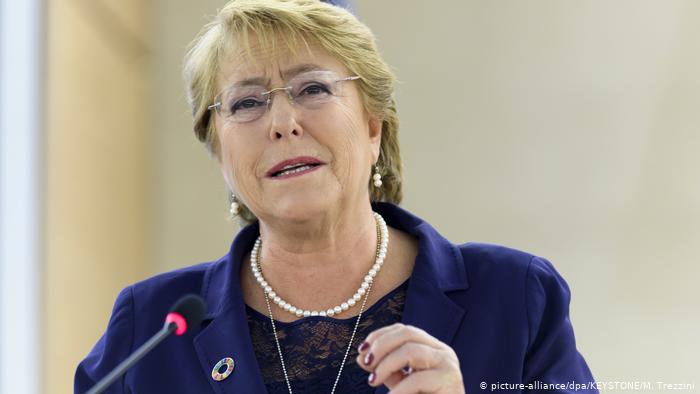The chutzpah of the United Nations’ Office of the High Commissioner for Human Rights (OHCHR) in approaching the Supreme Court of India to be made amicus curiae (third party) in a case challenging the validity of the Citizenship Amendment Act (CAA) is astounding, to say the least. When CAA has been duly passed by both Houses of Parliament in the world’s largest democracy and the matter is in court, the UN body’s intervention could have been laughed away as overreach but for an obviously malevolent attempt to besmirch India’s reputation by the office of Michelle Bachelet, the former President of Chile who is now the UN High Commissioner for Human Rights. Two things stand out in this move: first, OHCHR’s complete blindness to the rampant violation of human rights by India’s immediate neighbours, namely Pakistan and Bangladesh—violations because of which the minority population in these two countries have decreased drastically, unlike in India where various minority communities have been thriving, as obvious from their burgeoning numbers; and second, the abysmal ignorance of the UN body, for it comes across as uneducated in its inability to read and understand a law which is all about expediting the citizenship of minorities fleeing from persecution in the three Muslim majority countries of Pakistan, Bangladesh and Afghanistan, and is not about taking away the citizenship of Indian Muslims. Any cursory reading of the CAA would have made the issue clear to the OHCHR. Since there is no reason to believe that Bachelete’s office is staffed with people who do not have the basic knowledge of English or do not know how to do a simple fact check by using that ubiquitous engine of information known as Google, the question that arises here is of intent and agenda. Because that is what this demand for intervention is coming across as—an agenda-driven move initiated with the mala fide intent of selectively targeting the government of Prime Minister Narendra Modi and in the process India and its majority community. And what locus standi does OHCHR have in intervening in the matters of a sovereign nation? Even if the OHCHR believes that it has the mandate to intervene in matters related to sovereign nations “to protect and promote all human rights and to conduct necessary advocacy”, the simple question that it needs to answer is how it has been missing the carnage of the minority populations in Pakistan and Bangladesh in particular. Things have come to such a pass in Bangladesh that there is a real fear that inside the next three decades Hindus will become extinct in that country. The situation is equally bad in Pakistan, or perhaps worse, with murder, abduction, rape, forced conversions being the order of the day as far as the minority population—Hindus, Sikhs, Christians—is concerned. It is Pakistan, not India, which has the blasphemy law which is selectively used to harass the minority population. But how many times has the OHCHR jumped into the affairs of that country to protect the oppressed minorities? The larger question in this regard is if the OHCHR is coming under the influence of the very active anti-India lobby functioning globally, comprising both Islamist/Wahhabi and western elements. In fact, it was during Bachelet’s predecessor Zeid Raad Al Hussein’s time that this effort started. It was Hussein who brought out a report very critical of the Modi government’s handling of Kashmir and started raising the matter from every platform possible. Bachelet has gone a step further and is perhaps even trying to intimidate the Supreme Court into giving a verdict against CAA. Ever since a strongly nationalist, India-first Modi government has come to power in 2014, an active global campaign has been launched by Rawalpindi GHQ, backed by money possibly from the Middle East, to paint India into a corner. The fake narrative of intolerant, fascist India was spun with glee over stray incidents of violence, by elements from within the country and was pushed globally. But since that did not stop the Prime Minister from returning to power with an even bigger mandate in 2019, the campaign of calumny has been stepped up not only to accuse the Modi government but also the majority community of militant and militarized nationalism. This Pakistani campaign has reached a crescendo with the move to abrogate Article 370, which settled the Kashmir issue for good as far as India is concerned. The passage of CAA has added fuel to that campaign, with India’s minority population being instigated into believing that they will be losing their citizenship because of it. As it is India’s so-called liberal section of opinion makers are arrayed against the current government and it is with their active participation that a global campaign has been launched to paint CAA as an illiberal and inhuman law. So it is not a surprise that a communal clash between two communities gets reported by global media as a pogrom of Muslims by militant Hindu mobs backed by the government. Of course one of the primary aims of this campaign is to scare foreign investors into staying away from a “volatile” India. And it looks like the OHCHR has thrown in its lot with this campaign, perhaps also as pressure tactics to make India sign the refugee convention and make it accept droves of Rohingya Muslims fleeing from Myanmar and trying to infiltrate into India through Bangladesh. However, as a “responsible” UN body, the OHCHR is better off staying away from playing such bias-ridden games. The OHCHR needs to be put in its place.

